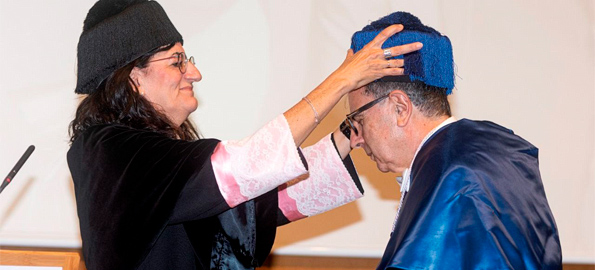Scientific reference
Avelino Corma, Distinguished Research Assistant at the UPV, awarded an Honorary Doctorate by the University of Huelva
[ 31/10/2023 ]
velino Corma, a distinguished researcher at the Universitat Politècnica de València (UPV), founder of the Institute of Chemical Technology (ITQ) a joint centre of the UPV and the Spanish National Research Council (CSIC)-, and Research Professor ad honorem at the CSIC, has been awarded an Honorary Doctorate by the University of Huelva (UHU).
During the investiture ceremony, promoted by the Faculty of Experimental Sciences of the UHU and defended by the Centre for Research in Sustainable Chemistry (CIQSO), the Rector of the University of Huelva, María Antonia Peña, described Corma as "a scientific reference of the first order, who gives us prestige and impetus, and whom we want to consider one of our own".
Corma thanked his family, those who trained him, and his colleagues
For his part, the award-winner considered it "an honour" to become part of the Senate of Doctors of the UHU, and praised the work carried out over the years by the Huelva faculty, which he considers "an example that you can start from scratch and, with hard work, become a reference in Spain in many fields".
Likewise, during his speech, the founder of the ITQ (UPV-CSIC) also dedicated particular emotional words to his parents, his teachers, his wife, and his daughter, as well as thanking and acknowledging the work of his colleagues throughout his career.
Four decades of success and commitment
Born in Moncofa (Castellón) in 1951, Corma has spent almost 40 years researching heterogeneous catalysis in academia and in collaboration with industry. He has worked on fundamental aspects of acid-base and redox catalysis to understand the nature of active sites and reaction mechanisms, on the basis of which he has developed catalysts that are now used commercially in numerous industrial processes.
A world-renowned and recognised expert in solid acid and bifunctional catalysts for energy chemicals and for making chemical processes more sustainable - especially in synthesising and applying zeolite catalysts - Corma has published over 1,400 research papers and invented more than 200 patents. A graduate in Chemical Sciences from the Universitat de València, he completed his PhD in Madrid under the supervision of Professor Antonio Cortés and completed a two-year postdoc at Queen's University.
A member of numerous international circles, Corma has given many lectures around the world, such as the Director's Distinguished Lecture Series at the Pacific Northwest National Laboratory, the 48th W. N. Lacey Lectureship in Chemical Engineering-Caltech in 2015, or the Karl-Ziegler-Lectureship at the Max Planck Society (2007), among many others.
It is also difficult to list all the prestigious awards the Valencian Research Assistant has received. These include the European Inventor Award for Lifetime Achievement from the European Patent Office, the Blaise Pascal Medal for Chemistry from the European Academy of Sciences, and the Prince of Asturias, ENI and Spiers Memorial awards.
Outstanding news
 Study a degree at the best technological university in Spain
Study a degree at the best technological university in Spain
The Universitat Politècnica de València is ranked number 1 among Spanish technology universities, according to the Shanghai ranking
 National Research Award
National Research Award
Ramón Martínez Máñez has received the "Juan de la Cierva" National Research Award in the area of Knowledge Transfer
 The UPV and Beihang University strengthen their academic and scientific alliance
The UPV and Beihang University strengthen their academic and scientific alliance
The two universities have signed a new collaboration agreement as part of the celebration of "UPV Day" in China
 Study in English
Study in English
The UPV offers eight degrees, 16 master's and 650 courses in English for the 2025-26 academic year
 THE Impact Ranking
THE Impact Ranking
The UPV, the Spanish university with the greatest social and economic impact in the world


